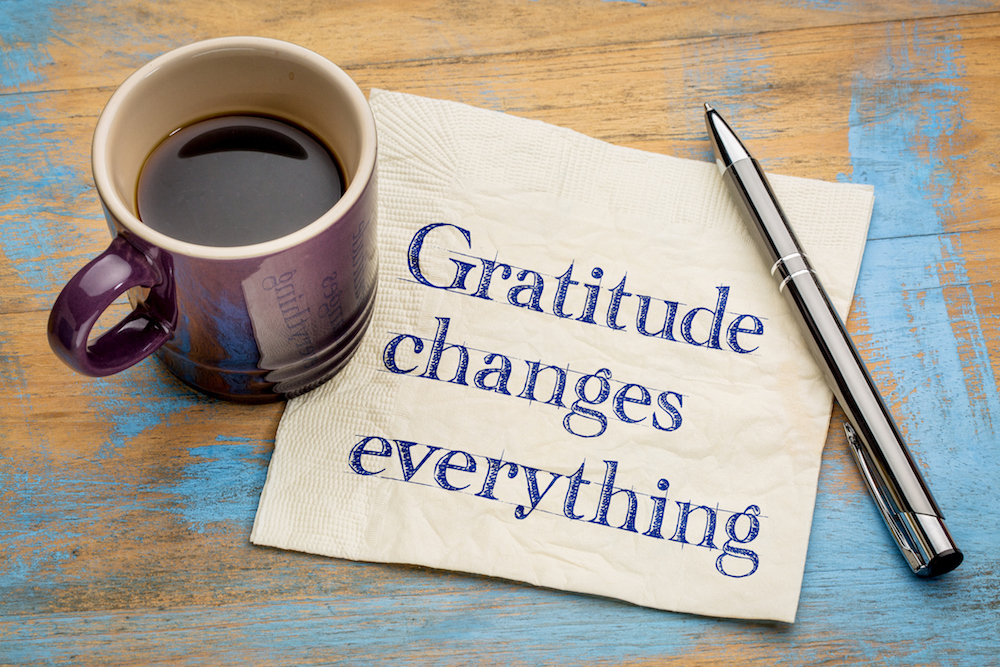3 Techniques to Master Daily Gratitude

Gratitude: It’s an awesome feeling, isn’t it? So awesome, in fact, I’d love to bottle it up and have a shot every time I’m feeling anxious, nervous, or angry.
As important as it is to experience gratitude on a daily basis, it’s incredibly difficult to do so during the times we need it most—such as when we are challenged or facing obstacles that seem insurmountable. In these moments, we clam-up, think only of the task that’s right in front of us; we forget just how insignificant these challenges will be a day, week, or month from now.
It’s in these moments when we must practice gratitude the most. Science has shown us that the brain can’t experience two emotions at once. On the whole, that’s both a blessing and a curse, but in this case, it’s a blessing. Why? By cultivating gratitude as the brain’s first response, our reaction to negative experiences will become positive (e.g., peace, love, happiness, abundance)—not fear, anxiety, or anger.
The question is: How do we cultivate gratitude?
Here are three mental processes that I’ve used a bunch this year to grow my gratitude. They have helped me far more than writing down things I’m grateful for (the traditional approach).
Technique 1: Miss Val’s Morning Gratitude
Michael Gervais hosts one of my favorite podcasts, Finding Mastery. In a recent episode, he hosted 7x NCAA national champion and UCLA women’s gymnastics coach Valorie Kondos, who is most commonly known as Miss Val.
Miss Val believes that gratitude is the most important technique to train. As she often says, “Being pessimistic is the easy way out.”
Even when being diagnosed with cancer, she flipped the script and would commonly tell her gymnasts, “I get to go to my chemo spa.” Crazy, right? Not to her. She had gratitude for the opportunity to get better.
Miss Val’s technique for practicing gratitude is simple, yet effective. It starts the moment she wakes up: “When I wake up in the morning, I have tremendous gratitude for living yet another day, even before anything has happened.”
She then layers this gratitude with even more specific thoughts of thanks. On her walk to the bathroom, for instance, she focuses only on gratitude for the things around her. On the way back to the bedroom, this process continues—and on into the kitchen, and so forth. Before long, she had trained her mind to lean on positive gratitude over pessimistic or negative thoughts.
Bottom line: Let the first thoughts of your day be those of gratitude. They don’t have to be complex; they can be as simple as, “I’m so grateful to have an apartment with heat and electricity,” or “I’m so grateful to have had dinner with my brother last night.”
The point is training your mind to see the world with a lens of thanks—an instinctive positivity that crushes negative thought.
Technique 2: James Altucher’s Childlike Gratitude
New York Times best-selling author, entrepreneur, podcast host, and many-time millionaire James Altucher has been described by Forbes as the most interesting man in the world.
Last fall, Tom Alaimo and I had James on our podcast, during which James shared one of his techniques for practicing gratitude.
It’s definitely odd, but effective. I use it when walking through airports or shuffling along the streets of New York City.
Here’s the gist: Envision every person pass on the street as a child. This creates a connectedness with that person, and a sense of gratitude that we are all vulnerable humans on this crazy planet together.
It changes your perspective from one of isolation and individual survivalism to one focused on opportunity through community.
I know it’s odd, but I love this technique. (Oh, and here is a link to the podcast with James if you want to learn more.)
Technique 3: The Stoic’s Gratitude for Everything
Let’s jump back in time for this third technique—to a few thousand years ago and the age of the Stoics.
Ryan Holiday, my favorite author, has wrote about this Stoic gratitude technique many times over.
In short, the Stoics practiced grateful for everything that happened to them. They knew that they could not impact external circumstances, but could only control their reactions to them. So, they chose to be thankful.
I want this technique chiseled into my office wall because it’s so freaking effective. If you are grateful for everything, you lose the fear of the unknown. You know deep down that you’ll deal with whatever comes at you, and you’ll make the best of it.
#
There’s no question that we need more gratitude. But how many of us are practicing gratitude in our daily lives?
With these three techniques, that will become a lot easier.
Are there other gratitude practices you use on a regular basis? Let me know in the comments below!
Make time in your mornings for gratitude and reflection by using this you-focused Morning Routine.
Sign up now to get our FREE Morning Routine guide—the #1 way to increase productivity, energy, and focus for profitable days. Used by thousands of fitness, business, and finance industry leaders to leapfrog the competition while making time for the people who really matter. Learn more here.
